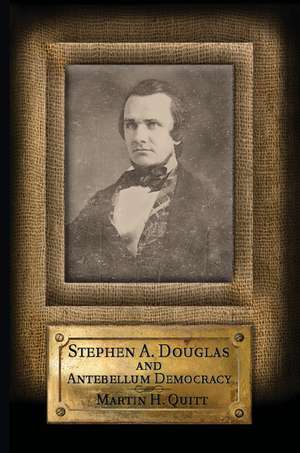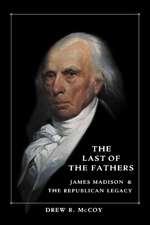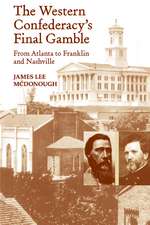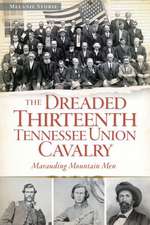Stephen A. Douglas and Antebellum Democracy
Autor Martin H. Quitten Limba Engleză Paperback – 23 sep 2012
Preț: 205.41 lei
Nou
Puncte Express: 308
Preț estimativ în valută:
39.32€ • 42.72$ • 33.05£
39.32€ • 42.72$ • 33.05£
Carte tipărită la comandă
Livrare economică 21 aprilie-05 mai
Preluare comenzi: 021 569.72.76
Specificații
ISBN-13: 9781107639010
ISBN-10: 1107639018
Pagini: 220
Ilustrații: 1 table
Dimensiuni: 155 x 234 x 14 mm
Greutate: 0.41 kg
Ediția:New.
Editura: Cambridge University Press
Colecția Cambridge University Press
Locul publicării:New York, United States
ISBN-10: 1107639018
Pagini: 220
Ilustrații: 1 table
Dimensiuni: 155 x 234 x 14 mm
Greutate: 0.41 kg
Ediția:New.
Editura: Cambridge University Press
Colecția Cambridge University Press
Locul publicării:New York, United States
Cuprins
1. Adolescence in Vermont; 2. Schooling, learning and passing the bar; 3. Family influence, stress and bonds; 4. Democratic prodigy in Illinois; 5. Douglas's constitutionalism, part i: noncitizen voting, apportionment and internal improvements; 6. Douglas's constitutionalism, part ii: slavery in the territories; 7. The campaign of 1860 and the code against campaigning; 8. In Lincoln's shadow; 9. Douglas's Mississippi slaves.
Recenzii
'Martin H. Quitt's sympathetic but unapologetic biography of Stephen A. Douglas departs from traditional studies of one of the dominant political figures of the antebellum era.' Erik B. Alexander, Journal of American History
'In terms of research, the book is marvelous; the author's intensive labor in secondary sources is awe-inspiring, and he has found new primary sources concerning Douglas's education, family, and marriage to Adele Cutts.' James L. Huston, Journal of the Early Republic
'Martin H. Quitt's interpretation of Stephen A. Douglas is intriguing, and original.' Graham A. Peck, Journal of Illinois State Historical Society
'… demonstrates the enormous potential of political analysis interwoven with cultural and social history. … a fascinating study of the social, cultural, and psychological, as well as ideological origins of Douglas's fervent belief in the right of (white) local majorities to control their own institutions - that is, in popular sovereignty. Employing manuscript collections, public records, local histories and political documents, Quitt argues that Douglas' commitment to popular sovereignty predated and transcended his antebellum political and economic interests. … a nuanced analysis of a flawed statesman and the doctrine that defined his career.' Civil War History
'Quitt's perceptive work on this psychologically complex and highly significant politician demonstrates that despite the Little Giant's failings, we should continue to reckon with him.' Matthew Norman, Journal of Illinois History
'By situating Douglas' political theories within his social milieu and psychological background, Quitt develops a nuanced analysis of a flawed statesman and the doctrine that defined his career.' Michael E. Woods, Civil War History
'In terms of research, the book is marvelous; the author's intensive labor in secondary sources is awe-inspiring, and he has found new primary sources concerning Douglas's education, family, and marriage to Adele Cutts.' James L. Huston, Journal of the Early Republic
'Martin H. Quitt's interpretation of Stephen A. Douglas is intriguing, and original.' Graham A. Peck, Journal of Illinois State Historical Society
'… demonstrates the enormous potential of political analysis interwoven with cultural and social history. … a fascinating study of the social, cultural, and psychological, as well as ideological origins of Douglas's fervent belief in the right of (white) local majorities to control their own institutions - that is, in popular sovereignty. Employing manuscript collections, public records, local histories and political documents, Quitt argues that Douglas' commitment to popular sovereignty predated and transcended his antebellum political and economic interests. … a nuanced analysis of a flawed statesman and the doctrine that defined his career.' Civil War History
'Quitt's perceptive work on this psychologically complex and highly significant politician demonstrates that despite the Little Giant's failings, we should continue to reckon with him.' Matthew Norman, Journal of Illinois History
'By situating Douglas' political theories within his social milieu and psychological background, Quitt develops a nuanced analysis of a flawed statesman and the doctrine that defined his career.' Michael E. Woods, Civil War History
Notă biografică
Descriere
Demonstrates how Stephen Douglas's path to overnight stardom in Illinois led to his identification with the Democratic Party.











